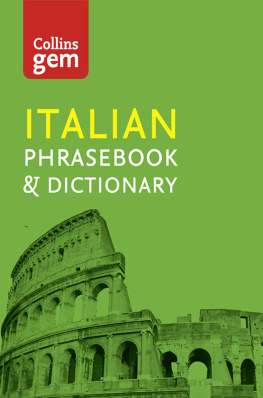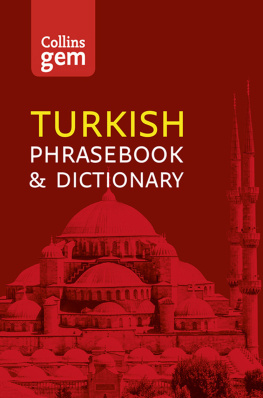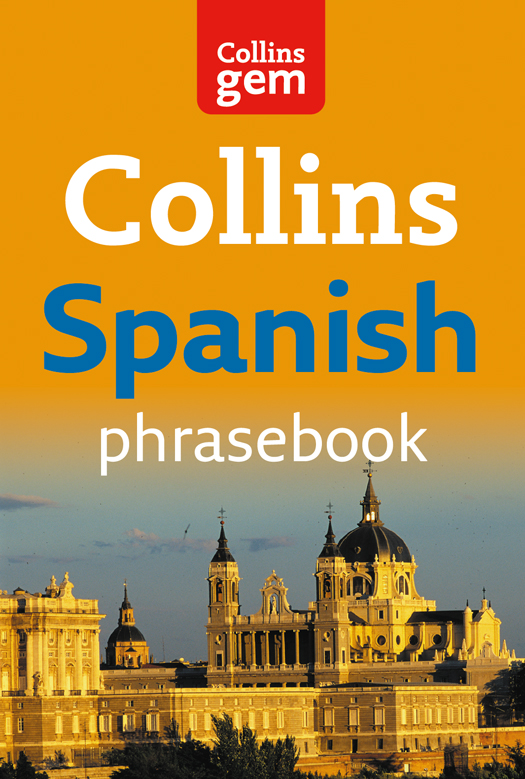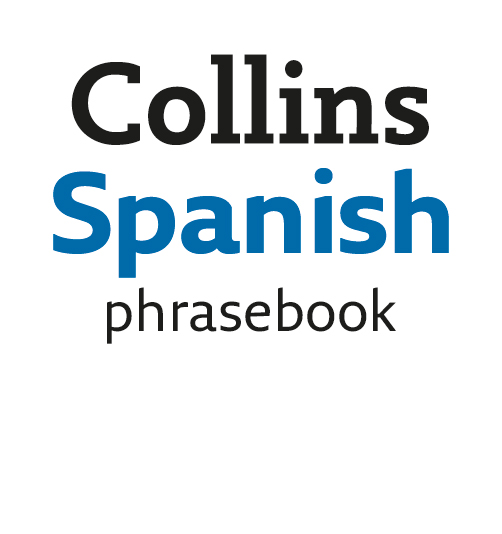This phrasebook includes a two-way dictionary which can be searched at any time using the link at the end of each chapter, or by using the menu to move to the back of the phrasebook. You can use the back button to return to where you were in the phrasebook.
Your Collins Gem Phrasebook is designed to help you locate the exact phrase you need, when you need it, whether on holiday or for business. If you want to adapt the phrases, you can easily see where to substitute your own words using the dictionary section, and the clear layout gives you direct access to the different topics.
The Gem Phrasebook includes:
- Over 70 topics arranged thematically. Each phrase is accompanied by a simple pronunciation guide which eliminates any problems pronouncing foreign words.
- A Top ten tips section to safeguard against any cultural faux pas, giving essential dos and donts for situations involving local customs or etiquette.
- Practical hints to make your stay trouble free, showing you where to go and what to do when dealing with everyday matters such as travel or hotels and offering valuable tourist information.
- Face to face sections so that you understand what is being said to you. These example mini-dialogues give you a good idea of what to expect from a real conversation.
- Common announcements and messages you may hear, ensuring that you never miss the important information you need to know when out and about.
- A clearly laid-out 3000-word dictionary means you will never be stuck for words.
- A basic grammar section which will enable you to build on your phrases.
- A list of public holidays to avoid being caught out by unexpected opening and closing hours, and to make sure you dont miss the celebrations!
Its worth spending time before you embark on your travels just looking through the topics to see what is covered and becoming familiar with what might be said to you.
Whatever the situation, your Gem Phrasebook is sure to help!
Contents
Spelling and pronouncing Spanish are easy once you know the few basic rules. This book has been designed so that as you read the pronunciation of the phrases you can follow the Spanish. This will help you to recognize the different sounds and give you a feeling for the rhythm of the language. The syllable to be stressed is marked in bold in the pronunciation. Here are a few rules you should know:
| Spanish | sounds like | example | pronunciation |
| ca | ka | cama | ka-ma |
| co | ko | con | kon |
| cu | ku | cubo | koobo |
| ce | the | cena | the-na |
| ci | thee | cine | theene |
| ga | ga | gato | ga-to |
| go | go | algo | algo |
| gu | goo | algn | algoon |
| ge | khe | gente | khente |
| gi | khee | giro | kheero |
| j | kh | jueves | khwe-bes |
| ll | ly | llamo | lya-mo |
| ny | seor | se-nyor |
| ua | wa | cual | kwal |
| ue | we | vuelva | bwelba |
| v | b | vuelva | bwelba |
| z | th | Zaragoza | tha-ra-go-tha |
h is silent: hora o-ra, hola o-la.
r is rolled and rr even more so.
In Spanish, vowels (a, e, i, o, u) have only one sound. When you find two together, pronounce both of them in quick succession, as in aceite a-they-te.
Greet people with a Buenos das or Buenas tardes on entering a lift, as its rude not to acknowledge them.
Spain is not a queuing country: people do not queue in bus stops. In places such as shops, banks, markets etc, people ask quin es el ltimo? which means who is the last one?
When addressing elders or people you have been just introduced to, use the formal Usted mode of address.
It is normal for people to stand or sit very close to each other when talking, which may be closer than youre used to. Pulling away from your counterpart may be regarded as unfriendly.
Taking up spare seats at a table thats already occupied is not common.
The Spanish do not make a habit of saying please and thank you very much it is implied in the tone of voice. It is a cultural thing, so dont think they are being rude!
When you enter a restaurant or a home where people are eating, its polite to say que aproveche , meaning enjoy your meal.
If you receive a gift, you should open it straightaway and in front of the giver.
Expect to be interrupted when speaking!
Cover your shoulders and legs when visiting religious buildings.
The word for Mr is Seor (se-nyor) and for Mrs/Ms Seora (se-nyo-ra).
| Yes | S
see |
| No | No
no |
| OK! | Vale!
ba-le! |
| Thank you | Gracias
gra-thyas |
| Thanks very much | Muchas gracias
moochas gra-thyas |
| Hello | Hola
o-la |
|














